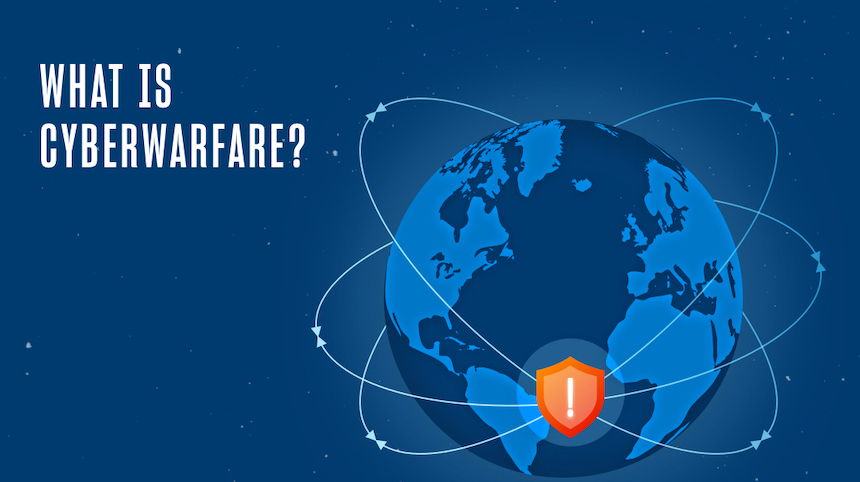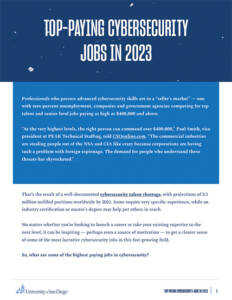Cyberwarfare is an evolving and increasingly popular way of attacking a nation or country via the Internet — and the effects can be detrimental. In this guide, we’ll discuss the different types of cyberwarfare, examples of recent incidents and tips for how companies and organizations can protect themselves against these types of harmful attacks.
Cyberwarfare vs. Cyber War vs. Cyberterrorism
What Is Cyberwarfare?
Cyberwarfare is an internet-based attack on a nation or country’s government with the intention of causing disruption and damage. As Britannica explains, “cyberwar is usually waged against government and military networks in order to disrupt, destroy, or deny their use. Cyberwar should not be confused with the terrorist use of cyberspace or with cyberespionage or cybercrime.”
Cyberwarfare vs. Cyber War vs. Cyberterrorism
Though all three are related, there are some distinct differences:
- A cyber war refers to the conflict itself, whereas cyberwarfare refers to the techniques and strategies used.
- Cyberterrorism is “the politically motivated use of computers and information technology to cause severe disruption or widespread fear in society.”
- According to ScienceDirect “cyberwarfare differs from cyberterrorism as it is an organized effort by a nation state to conduct operations in cyberspace against foreign nations.”
Types of Cyberwarfare and Cyberterrorism Attacks
Cyberwarfare and cyberterrorism come in many forms. Here are some of the most common types, courtesy of Check Point and Imperva:
- Economic disruption — In this type of attack, hackers specifically target computers and networks related to banks, stock markets or payment systems.
- Propaganda — This method involves spreading lies or exaggerated information so that people will question their country’s government and/or side with the antagonists.
- Attacking the electrical power grid — By disabling a power grid, hackers can wreak havoc on communications and bring massive disruption to a country’s infrastructure and access to essential services.
- Sabotage — This includes leaking compromised information, making insider threats and targeting disgruntled government employees who are willing to carry out work against their own country.
- Espionage — This type of attack typically involves stealing another country’s secrets or classified information.
- Distributed Denial of Service (DDoS) attacks — Hackers will overwhelm a website with spam requests in order to disrupt operations. This may also deny legitimate users access to critical services and support.
- Ransomware — A popular type of cyber attack, ransomware involves encrypting files or blocking computer access until the victim(s) pay a ransom to the hackers.
- Phishing — These types of attacks involve sending fraudulent communications, typically emails and text messages, that appear to come from a trusted source. The communication includes a link, which if clicked, can lead to the installation of malicious software or the beginning of a ransomware attack.
What Is the Purpose of Cyberwarfare?
There are many reasons why hackers would engage in cyberwarfare. In a lot of cases, the reasons are military- or government-related with the goal of disrupting a country’s critical operations and infrastructure and/or gaining access to research and intelligence.
Cyberwarfare may also be financially motivated, which is where ransomware often comes in.
Another popular reason may be “hacktivism” — a combination of hacking and activism — that’s defined as “misusing a computer or the internet, primarily by way of hacking into unauthorized networks, to explore a believed injustice.” Hacktivisim may be politically, socially or religiously motivated.
While some hacktivism attacks are not necessarily malicious, they are all still illegal.
History of Cyberwarfare
The first mention of cyberwarfare was documented in 1987; according to Wired, a magazine article “described future wars fought with giant robots, autonomous flying vehicles, and autonomous weapon systems.”
The idea of cyberwarfare evolved to later focus on computers and the rise of the Internet. An article published in 1993 by two employees at the RAND Corporation talked about hackers using military computers as a means of disruption; years later analysts at RAND realized that attacking non-military computers would be just as easy — if not easier.
Wired explains that the term was more clearly defined in the 2010 book “Cyber War,” co-authored by Richard Clarke, who served as the national security advisor to several U.S. presidents; and Robert Knake, who was a cybersecurity advisor to President Obama. They defined cyberwarware as “actions by a nation-state to penetrate another nation’s computers or networks for the purpose of causing damage or disruption.”
Examples of Cyberwarfare
The Center for Strategic & International Studies (CSIS) has a list of significant cyber incidents dating back to 2006, some of which include incidents of cyberwarfare. In November 2022, the United Arab Emirates recruited three former U.S. government officials to assist with breaking into computers in the United States and other countries. In the same month, hackers targeted the network of the Danish State Railways, which disrupted train operations for hours.
Additional examples include:
- In 2010, “cyber attack on the Iranian nuclear fuel processing facility resulted in the physical destruction of almost 1,000 uranium enrichment centrifuges by the Stuxnet computer worm. The evidence points to the worm having been created by the United States and Israel in a collaborative effort known as Operation Olympic Games.”
- Russia has executed (or attempted to execute) numerous cyberwarfare attacks against Ukraine’s government. This list from CSIS details the most recent instances in 2021 and 2022.
How to Combat Cyberwarfare
In order to stay one step ahead of cyberwarfare attacks, companies and organizations should continually conduct risk assessments and audits. Additional measures should include:
- Ensuring your organization has access to the latest security updates and technology.
- Using best practices when it comes to cybersecurity (such as strong passwords, file encryption, authorized access, etc.) and conducting regular employee/organizational training.
- Employing cybersecurity experts and/or cybersecurity consultants who have the knowledge and experience to work on the front lines against hackers and combat potential threats.
- Other options include “threat hunting,” upgrading patch management processes and working to mitigate supply chain risks.
Frequently Asked Questions
Interested in Advancing Your Cybersecurity Skills to Help Combat Cyberwarfare?
Consider furthering your education with the University of San Diego — a highly regarded industry thought leader and education provider that offers two advanced degrees in cybersecurity taught by expert instructors who share insights drawn from relevant industry experience.
The 100% online Master of Science in Cyber Security Operations and Leadership program is designed for career-focused professionals who are interested in gaining a deeper understanding of cybersecurity concepts, topics and theories, along with leadership skills. Students will gain specific knowledge and skills in the areas of technology, law, policy, compliance, governance, intelligence, incident response and management.
USD’s Master of Science in Cyber Security Engineering has been designated as a National Center of Academic Excellence in Cybersecurity. Each CAE-designated program equips students with the necessary skills, knowledge and tools to succeed in cybersecurity.
USD’s Master of Science in Cyber Security Engineering, which is offered both on-campus and online, is ideal for recent graduates and skilled professionals with an engineering background who are currently working in a wide range of cybersecurity roles or aspiring to work as a security engineer. Students will learn about digital and network forensics, the technical considerations for incident response and continuity planning, and much more.
If you have any questions or you’d like more information, please contact a USD enrollment advisor today.


